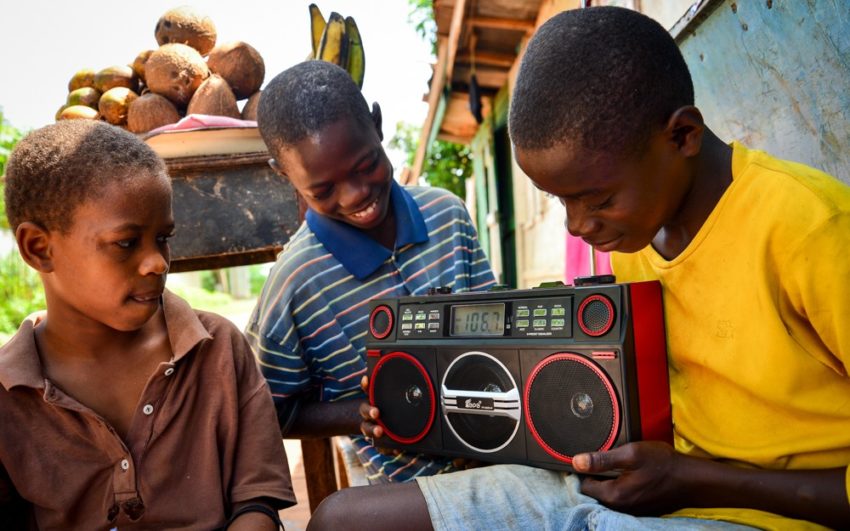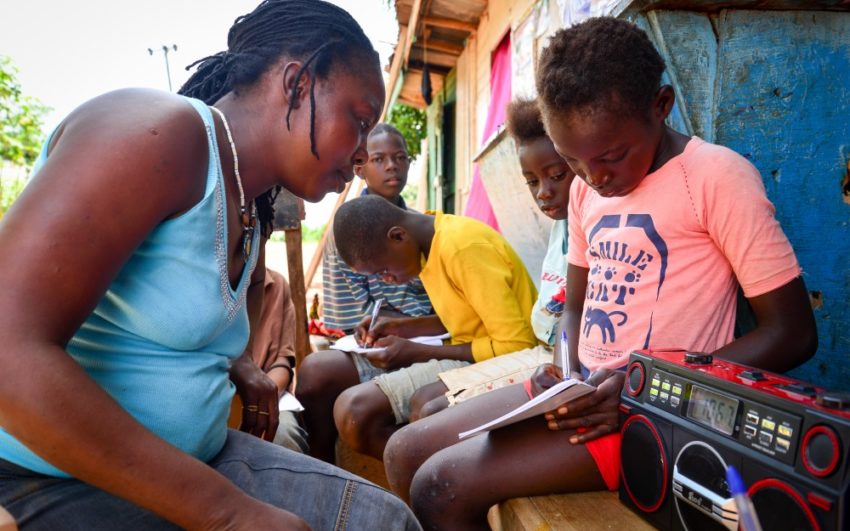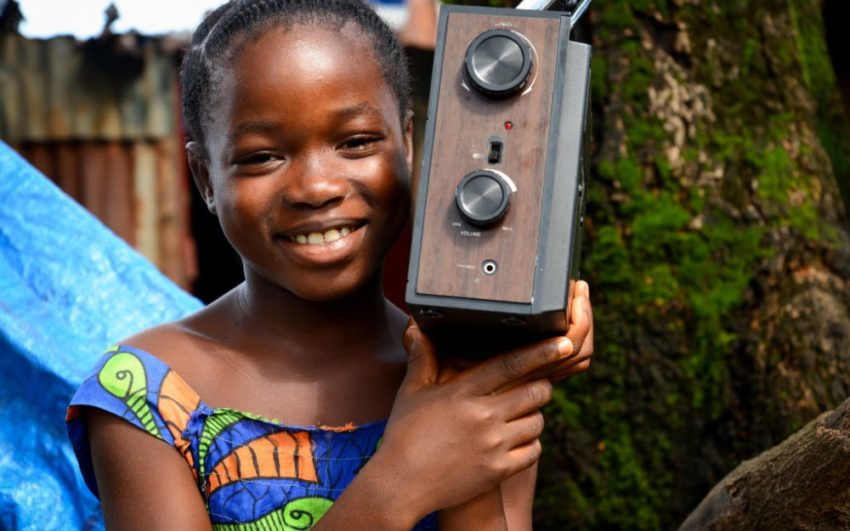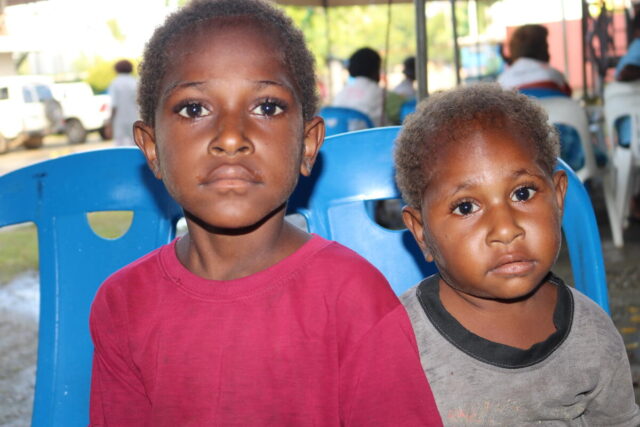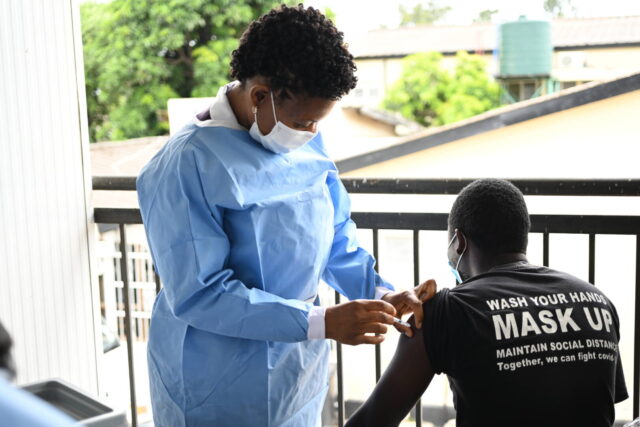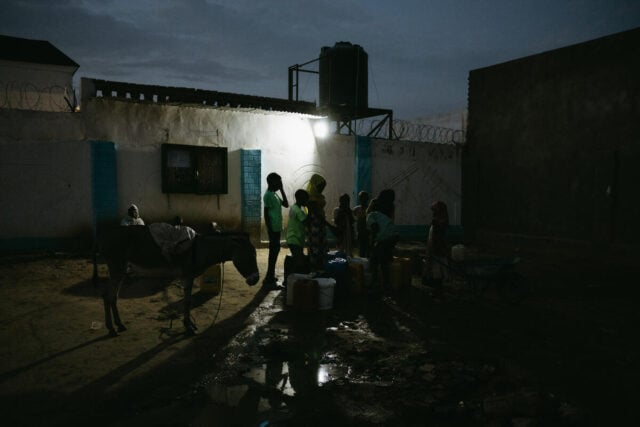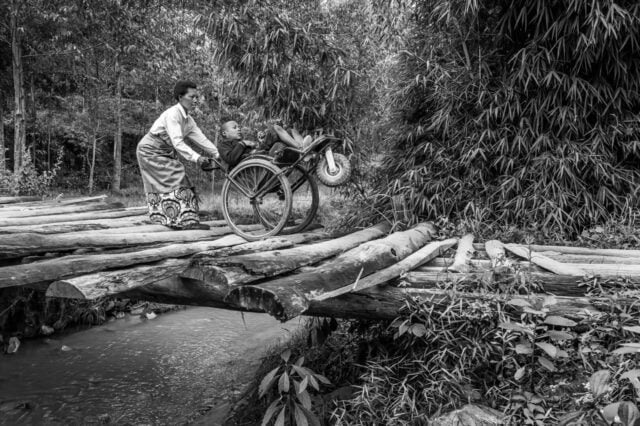In March 2014, Ebola began to spread throughout West Africa, with Sierra Leone bearing the brunt of the rare, deadly virus. When the World Health Organization declared the outbreak an “international health concern” in August 2014, Sierra Leone outlawed mass meetings and closed schools, disrupting the education of an estimated 1.7 million children. It would take nine months for schools in Sierra Leone to reopen. Discover the impact of Ebola on education in Sierra Leone.
Educational programs in Sierra Leone during the Ebola outbreak
World Vision helped Sierra Leone’s Ministry of Education, Youth and Sports department set up educational programming for national television and 41 community radio stations to cover the country. We donated equipment — including 30,000 solar-powered radios — and funded recording sessions and accommodations for teachers who prepared the classes. Broadcasts began in October 2014.
The program has two shifts: primary lessons in the morning and secondary subjects in the afternoon. At the end of each session, pupils are given an assignment to prepare.
‘Despite Ebola, … I am still learning’
Instead of attending fourth grade class at United Methodist Primary School in Aberdeen, Sierra Leone, 12-year-old Rugiatur (Rugi) Kamara tunes into classes on her family’s portable radio.
With schools closed because of the threat of Ebola, “the radio teaching program is a blessing to our children, so we will take every advantage of it,” says Baby Kamara, Rugi’s mother.
Ebola has disrupted all pupils’ academic year, per World Vision staff.
“Ebola has made me stop going to school,” says Rugi, “and also my mother don’t sell [food in the market] anymore, and my father don’t go to work.” Rugi’s father worked at a water taxi service that shut down for lack of business after the Ebola outbreak.
For Rugi, the radio is a lifeline. Sitting under the mango tree in front of her family’s home, Rugi tunes the radio carefully until she hears, “Good day, boys and girls, how are you? Today’s lesson is on addition. …”
When the reception falters, she lifts the radio close to her ear. “I don’t want to miss anything,” she says. When the class is over, Rugi writes her assignment, and her mother removes the battery to save it — it previously died during math lessons.
“Despite Ebola, … I am still learning,” Rugi says.
Overcoming challenges as schools prepare to reopen
To encourage re-enrollment, Sierra Leone’s government waived school fees for all children for the next two years. World Vision provided books, uniforms, and school supplies to the 58,000 children in its sponsorship program. To ensure that all children continue to have a safe transition back to class, we also provided schools with 16,780 hygiene kits as well as Ebola prevention information.
“There is still a tremendous amount to be done to ensure that classrooms are safe and supportive for our children,” says Leslie Scott, World Vision’s country director for Sierra Leone.
At the height of the Ebola crisis, many schools were used as treatment centers, and now need to be disinfected and refurbished for children’s use.
“Most children are very excited about going back to school after being idle at home for so long, but many are also fearful and worried,” says Alison Schafer, World Vision’s mental health and psychosocial support specialist, who is based in Freetown. “Although they may be concerned about the possibility of catching Ebola in the classroom, they are more worried that they’ve forgotten everything they’ve learned. They’re anxious about whether they can ever catch up.”
Alison is concerned that some pupils may never return to school.
“Many children began working — selling firewood and jobs like that — while out of school this past year,” she says. “It will be hard for struggling families to sacrifice even that small income and send their children back, especially girls. We must advocate that all children have the opportunity to return to school.
“Reopening schools is not just a one-off event. It’s going to be a months-long journey. We need to create a supportive learning environment where children feel safe to express their emotions about what they have endured.”
Alison says equipping teachers with psychosocial first aid skills is key to helping students get back to their books. She co-wrote a training manual being used nationally by the Ministry of Education, Science and Technology to help teachers recognize and deal with signs of stress in children, including poor focus, irritability, and hyperactivity. World Vision has also trained more than 1,000 teachers in psychosocial support skills.
Schools reopen in Sierra Leone
Eleven-year-old Millicent Bockarie proclaimed April 14, 2015, as “the best day of my life” — the day that Sierra Leone schools reopened and about 1.7 million children returned to school.
“[This] is a critical first step on the road to post-Ebola recovery,” says Leslie.
But school isn’t exactly how children in Sierra Leone remember it. In and out of the classroom, body contact is now strictly avoided, even handshaking. Boys can’t play soccer, and girls no longer enjoy their favorite game of touch-tag — all in a bid to prevent the spread of the Ebola virus.
“I was very happy to be back at school the first day, but inside I was also scared of Ebola,” recalls Millicent. “My parents warned me not to get very close to my friends and other students.” Her best friend, Isatu, agrees.
“A lot of changes have taken place in my school,” says Isatu. “Before Ebola, we used to sit three to a desk, but now we sit in twos so we don’t touch. Handwashing was never practiced the way it is now, and we are checked with a thermometer daily.”
While Ebola cases have dropped and most of the country’s districts have been without a case of the deadly disease for more than 21 days, precautions are still needed, explains Isatu’s teacher, Joseph Nallo.
“Now we have infrared thermometers to check children’s temperatures daily to detect fever, as well as buckets and sanitizer to ensure handwashing and hygiene,” Joseph says. If a child registers a temperature above 98.6 degrees Fahrenheit — a possible initial symptom of Ebola — they would contact the community nurse immediately.
Joseph is also thankful for attending World Vision’s three-day training course for teachers on psychosocial first aid skills.
“I could sense the children’s shock at being back in a routine. They couldn’t concentrate when schools first reopened,” he says. “Children who used to be very open and free seemed scared. Now they are coming to terms with the reality that Ebola is still around. But if we do what is right, we can contain it.”
Students are also realizing the impact of Ebola on their education.
“Millicent and I were always working on our parents’ farms when school was out, since we had nothing to do at home,” says Isatu. “I almost forgot everything I had learned. When school reopened, I found it a bit difficult to adjust.”
How you can help children in Sierra Leone
- Pray for children’s education around the world, and thank God that children were able to return to school in Sierra Leone.
- Sponsor a child in Sierra Leone to show the love of God to a child in need.
Contributors: Jonathan Bundu, Karen Homer, and Sahr Ngaujah, World Vision staff.
